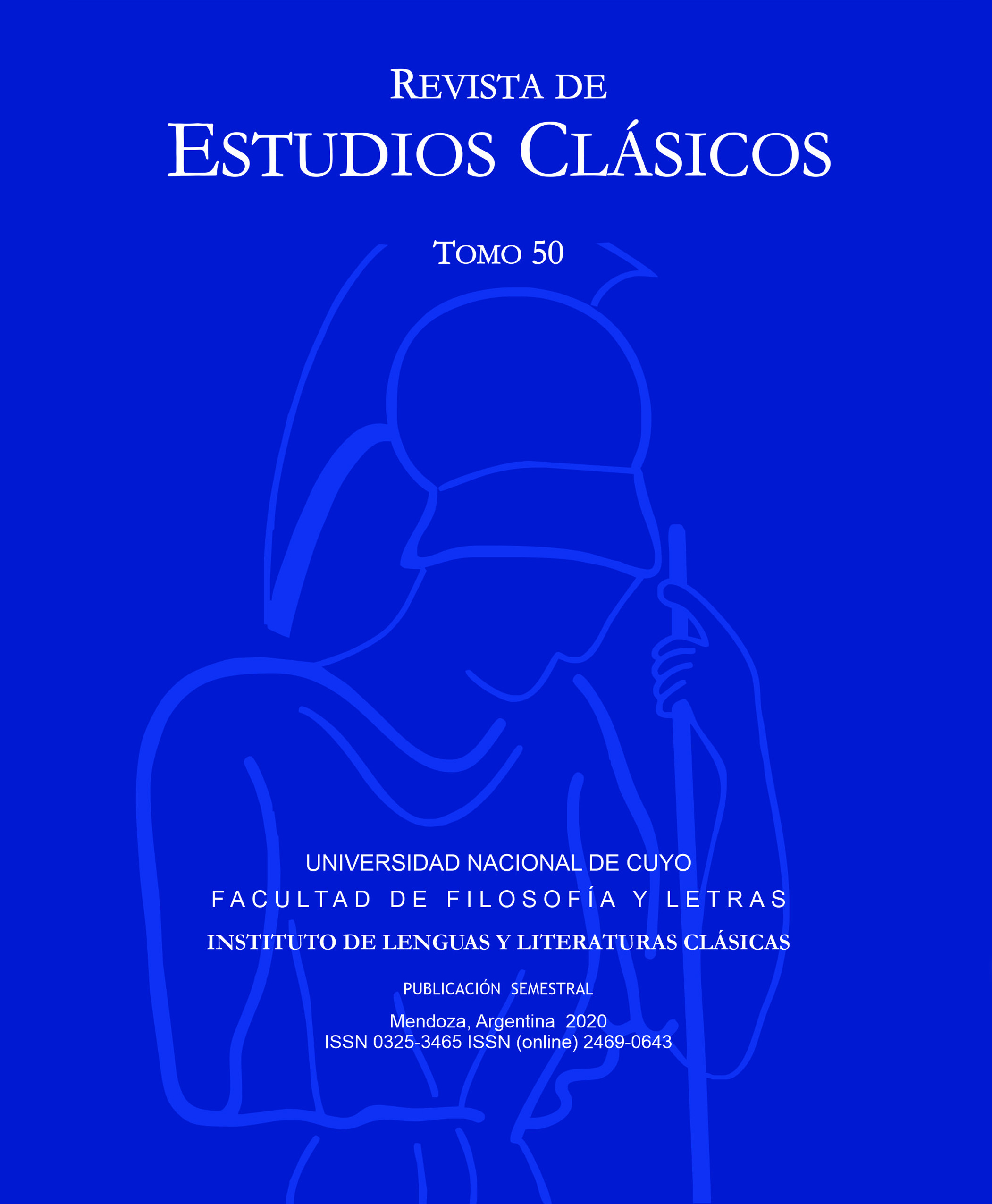A new approach about the Theogony of Hesiod
Keywords:
cosmology, deities, elements, Hesiod, TheogonyAbstract
In this article I have two objectives: to dismantle the theories about the Theogony of Hesiod, which identify some deities of the Greek pantheon with cosmic regions and abstractions, and, at the same time, to clarify how the elements, regions or ambits ruled by these deities are like, searching the connections between Hesiod and the following authors: Homer, Aeschylus, Aristophanes, Plato, Apollodorus, Diogenes Laertius, Quintus Smirnaeus and Nonnus of Panopolis.
References
Frazer, J.G. (ed.) (1921). Apollodorus. The Library. Cambridge: HUP.
Hall – Geldart (eds.) (1945). Aristophanes. Comoediae. Oxford: Clarendon Press.
Hicks, R. D. (trad.) (1925). Diogenes Laertius, Lives of Eminent Philosophers. Cambridge: HUP.
Evelyn-White, H. (trad.) (1914). Hesiod.The Homeric Hymns and Homerica. Cambridge, MA.: Harvard University Press.
Vianello de Córdova, P. (trad. ed.) (1978). Hesíodo, Teogonía. México DF: Universidad Nacional Autónoma de México.
Pérez Jiménez, A. (trad.) (2008). Hesíodo, Teogonía. Barcelona: Gredos.
Monro – Allen (eds.)(1920).Homer. Homeri Opera in five volumes. Oxford: Oxford University Press.
Rouse, W. (ed.) (1940-1942). Nonnus of Panopolis. Dionysiaca, 3 Vols. Cambridge, MA.: Harvard University Press.
Burnet, J. (ed.) (1903).Plato. Platonis Opera. Oxford: Oxford University Press.
Way. S. (ed.) (1913). Quintus Smyrnaeus. The Fall of Troy. London: William Heinemann; New York: G.P. Putnam's Sons.
Burkert, W. (1997). Griechishe Religion der archaischen und klassischen Epoche. Stuttgart: Verlag W. Kohlhammer.
Cornford, F. (1952). Principium sapientiae. The Origins Of Greek Philosophical Thought. Cambridge: Cambridge University Press.
Graziosi, B. (2016). “Theologies of the family in Homer and Hesiod”. En: Theologies of ancient Greek religion. Cambridge: Cambridge University Press, pp. 35-61.
Havelock, Erik (1987).The Cosmic Myths of Homer and Hesiod. En: Oral Tradition Journal, Slavica Publishers, pp. 31-53.
Johnson, D. (1999). Hesiod’s Descriptions of Tartarus. En: Phoenix, Vol. 53, No. 1/2 (Spring-Summer), Canada: Classical Association of Canada, pp. 8-28.
Kirk, G. - Raven, J. (1983). The Presocratic Philosophers: A Critical History With A Selection Of Texts, Second Edition. Cambridge: Cambridge University Press.
Most, G. (2013). “Eros in Hesiod”. En: Eros in Ancient Greece. Oxford: Oxford University Press, pp. 163-174.
Strauss-clay, J. (2003). Hesiod’s cosmos. Cambridge: Cambridge University Press.
Wade-gery, T. (1949). Hesiod. En: Phoenix Vol. 3 No.3, (Winter), Canada: Classical Association of Canada, pp. 81-93.
West, M. (1967). Hesiod’s fragments. En: The Classical Review. Oxford: Oxford Press.
Woodard, R. (2007). The Cambridge Companion To Greek Mythology. Cambridge: Cambridge University Press.
Grimal, P. (1981). Diccionario de la mitología griega y romana. Barcelona: Ediciones Paidós Ibérica.
Lidell – Scott – Jones (1966). A Greek-English Lexicon. Oxford: Oxford University Press.
Pabón, J. (2011). Diccionario Bilingüe Manual Griego Clásico Español, VOX, 24ª edición. Barcelona: Bibliograf.
Downloads
Published
How to Cite
Issue
Section
License
Copyright (c) 2021 autorAquellos autores/as que tengan publicaciones con esta revista, aceptan los términos siguientes:
- Los autores/as conservarán sus derechos de autor y garantizarán a la revista el derecho de primera publicación de su obra, el cuál estará simultáneamente sujeto a laLicencia Creative Commons Atribución-NoComercial-CompartirIgual 2.5 Argentina (CC BY-NC-SA 2.5 AR). (https://creativecommons.org/licenses/by-nc-sa/2.5/ar/)que permite a terceros compartir la obra siempre que se indique su autor y su primera publicación esta revista.
- Los autores/as podrán adoptar otros acuerdos de licencia no exclusiva de distribución de la versión de la obra publicada (p. ej.: depositarla en un archivo telemático institucional o publicarla en un volumen monográfico) siempre que se indique la publicación inicial en esta revista.
- Se permite y recomienda a los autores/as difundir su obra a través de Internet (p. ej.: en archivos telemáticos institucionales o en su página web) antes y durante el proceso de envío, lo cual puede producir intercambios interesantes y aumentar las citas de la obra publicada. (Véase El efecto del acceso abierto).


































